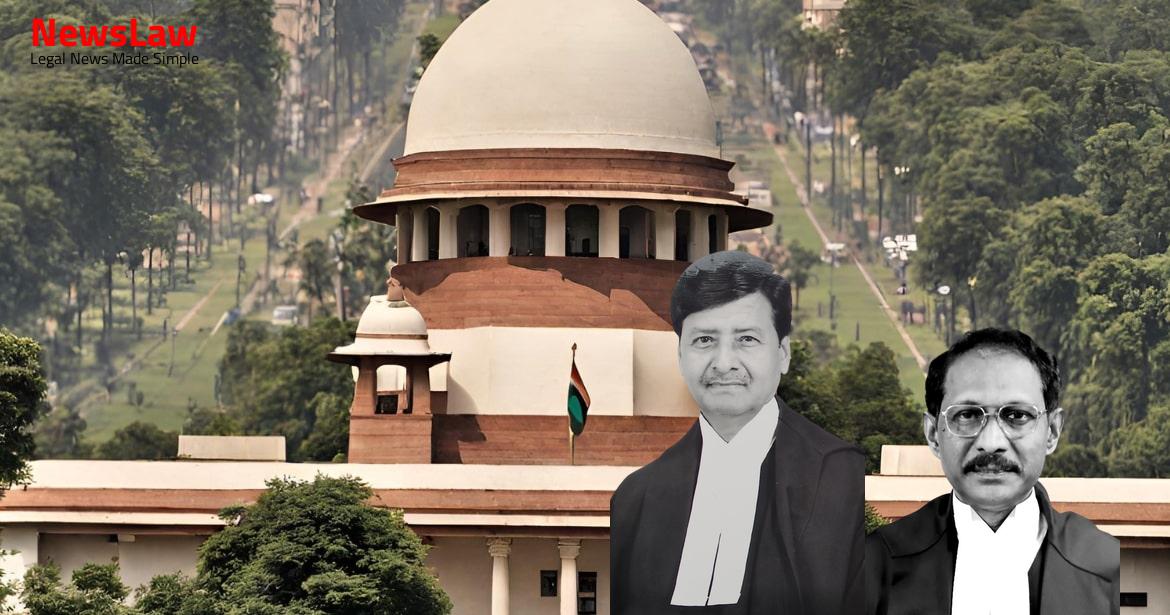Delve into the detailed legal analysis of the interpretation of SEBI regulations governing stock broker certificates. The recent court decision sheds light on the nuances of registration requirements and fee obligations for stock brokers operating across multiple stock exchanges. Understanding the court’s judgment is essential to ensure compliance within the securities market framework and align with the legislative intent. Follow our blog to stay updated on key legal developments in the financial sector.
Facts
- The Division Bench of the High Court of Delhi set aside the finding of the learned Single Judge under judgment dated 26 October, 2004.
- It was concluded that a single registration with SEBI is sufficient for stock brokers with memberships and functions from multiple stock exchanges.
- The Division Bench referred to Section 12(1) of the Securities and Exchange Board of India Act, 1992 regarding registration with SEBI.
- Paragraph (vi) of Part A of the Circular dated 28 March, 2002 issued by SEBI was set aside by the Division Bench.
- SEBI was established under the Act, 1992 to protect investor interests and regulate the securities market.
- The Hon’ble Supreme Court’s judgment on February 01, 2001 directed SEBI to amend the Regulations based on the recommendations of the R. S. Bhatt Committee Report.
Also Read: Admission Deadline Adherence in Medical Courses
Issue
- The question at issue is whether the ad valorem fee for an initial period of five years will need to be paid for every subsequent registration as well.
- This question is raised based on the arguments presented before the court.
Also Read: From Nominee to Disqualified: Supreme Court Scrutinizes Age Evidence, Declares Election Invalid
Arguments
- The Association contended that even if a stock broker has multiple registrations from SEBI, they should only pay fees for the initial registration, not for each stock exchange they operate in.
- The Learned Single Judge upheld the Circular dated 28 March, 2002, which determined the fee calculation method and dismissed the petition.
- On appeal, the Division Bench of the High Court ruled that a single registration with SEBI is required, even if a stock broker operates in multiple stock exchanges.
- The Division Bench stated that SEBI should refund fees paid for subsequent registrations after the initial one, as per their interpretation of Section 12(1) of the Act, 1992.
- The appellant’s counsel argued that the scheme of Regulations requires separate registrations for each stock exchange a broker operates in, emphasizing the need for multiple registrations.
- The respondents’ counsel argued that the scheme of the Act and Regulations does not explicitly require separate registrations for each stock exchange.
- The appellant’s counsel reiterated that fees imposed by SEBI are regulatory in nature and not a tax, with no requirement of quid pro quo for their imposition.
- The counsel highlighted the importance of multiple registrations based on the various membership categories in different stock exchanges where brokers operate.
- The appellant’s counsel criticized the emphasis of the High Court on the term ‘a certificate’ in Section 12(1) of the Act, stating that the scheme of Regulations mandates separate registrations for each stock exchange.
- Stock brokers are required to pay ad valorem fee only once for five years from the first of multiple registrations, according to the Learned Counsel for the respondents.
- The Circular dated 28 March, 2002, is considered ultra vires to the Act, 1992 as it compels stock brokers to pay ad valorem fee for multiple blocks of five years from the dates of their multiple registrations.
- The Division Bench examined the issue in light of the expression ‘a certificate’ in Section 12(1) of the Act, 1992, which does not require further interference.
- The schedule annexed to the Regulations cannot override the scheme of the Regulations, as argued by the Learned Counsel for the respondents.
- Stock brokers opted for multiple registrations out of caution after their initial registration, as the certificate issued in Form ‘D’ reflected the names of the stock exchanges of which they are members on the date of the initial registration.
- There is no provision to amend and insert the names of additional stock exchanges in the certificate, which follows a settled principle of law.
Analysis
- The interpretation of statutory provisions must align with the true intention of the legislature.
- In cases of ambiguity in language of the law, contextual and purposive interpretation becomes necessary.
- The scheme of the Securities and Exchange Board of India Act, 1992 and its regulations plays a crucial role in determining the obligations of stock brokers and the fees they are liable to pay.
- The importance of obtaining a certificate of registration from SEBI for each stock exchange where a stock broker operates has been emphasized.
- The requirement to pay fees for each certificate of registration held by a stock broker is highlighted.
- The significance of adherence to the regulations and guidelines set forth by SEBI for stock brokers is reiterated.
- The judicial rulings and circulars issued by SEBI provide clarity on the procedures and obligations of stock brokers in relation to registration and fees.
- The need for transparency and compliance with the regulatory framework in the securities market is underscored.
- Recommendations from expert committees regarding fee structures and turnover calculations for brokers are acknowledged.
- The understanding that annual turnover of a broker is a measure, not the subject of the levy, is clarified.
- Legislative intent is crucial in interpreting statutory provisions
- Purposive construction involves giving effect to legislative purpose
- The primary principle of interpretation is to construe according to the intent of the lawmakers
- When interpreting statutes, the court must always consider the object or purpose for which the statute was enacted
- Objectivity is key in interpreting legislative intent
- Interpreters should assume that lawmakers are reasonable people seeking to achieve reasonable goals
- Stock brokers, sub-brokers, share transfer agents, bankers to an issue, trustees of trust deeds, registrars to an issue, merchant bankers, underwriters, portfolio managers, and investment advisers must obtain a certificate of registration from the Board to buy, sell or deal in securities.
- Stock brokers can continue to buy, sell, or deal in securities if they have applied for registration until a decision is made on their application.
- The Board considers various factors for granting a certificate, including the eligibility of the stock broker to be a member of a stock exchange, infrastructure, past experience, disciplinary proceedings, and overall fitness.
- The Central Government formulated the Securities and Exchange Board of India (Stock Brokers and Sub-Brokers) Rules, 1992 under Section 29 of the Act.
- The Rules define key terms such as ‘stock exchange’ and ‘stock broker’ and mandate that no person can act as a stock broker without holding a certificate from the Board.
- Conditions for granting a certificate to a stock broker include membership in a stock exchange, compliance with rules and bye-laws, obtaining permission for any status or constitution changes, payment of fees, and grievance redressal for investors.
- A stock broker whose application for a certificate is rejected cannot buy, sell, or deal in securities as a stock broker.
- Payment of fees is mandatory for certificate applicants, and failure to pay may result in suspension of the registration certificate.
- The stock exchange must promptly forward the application form to the Board within thirty days of receiving it from the stock broker.
- The Court clarifies that the question of actions against a stockbroker for default or disqualification is not under consideration in the current proceedings.
- There may be a mechanism in place where if a stockbroker, who is a member of the stock exchange, defaults or is disqualified, certain actions can be taken as per a specific circular.
Decision
- Pending application(s) to be disposed of
- No costs to be imposed
- Appeal allowed and judgment of Division Bench of High Court quashed
- Previous Civil Appeal No. 435 of 2007 judgment referred to
- Appeals in Civil Appeal No. 5076 of 2007 and Civil Appeal No. 3003 of 2011 allowed
Case Title: SECURITIES AND EXCHANGE BOARD OF INDIA Vs. NATIONAL STOCK EXCHANGE MEMBERS ASSOCIATION (2022 INSC 1076)
Case Number: C.A. No.-000435-000435 / 2007



